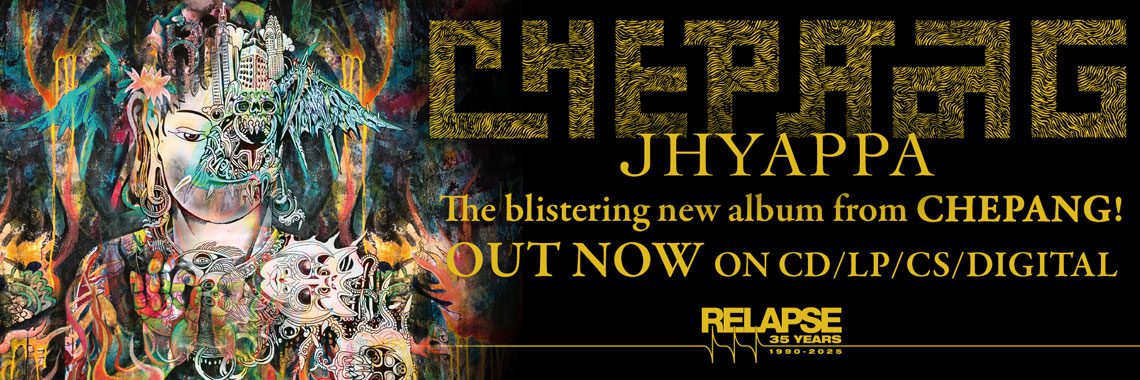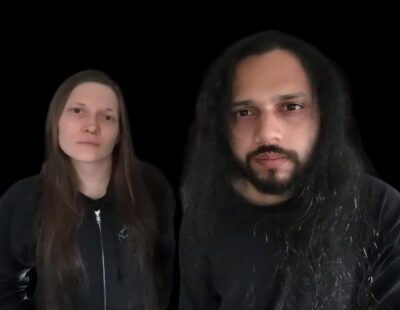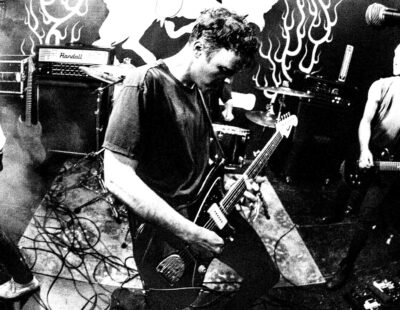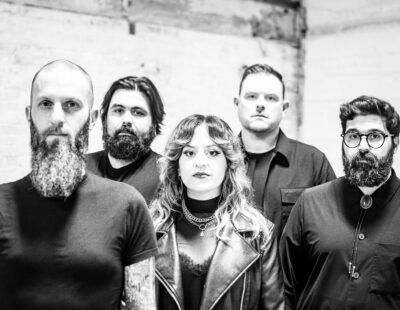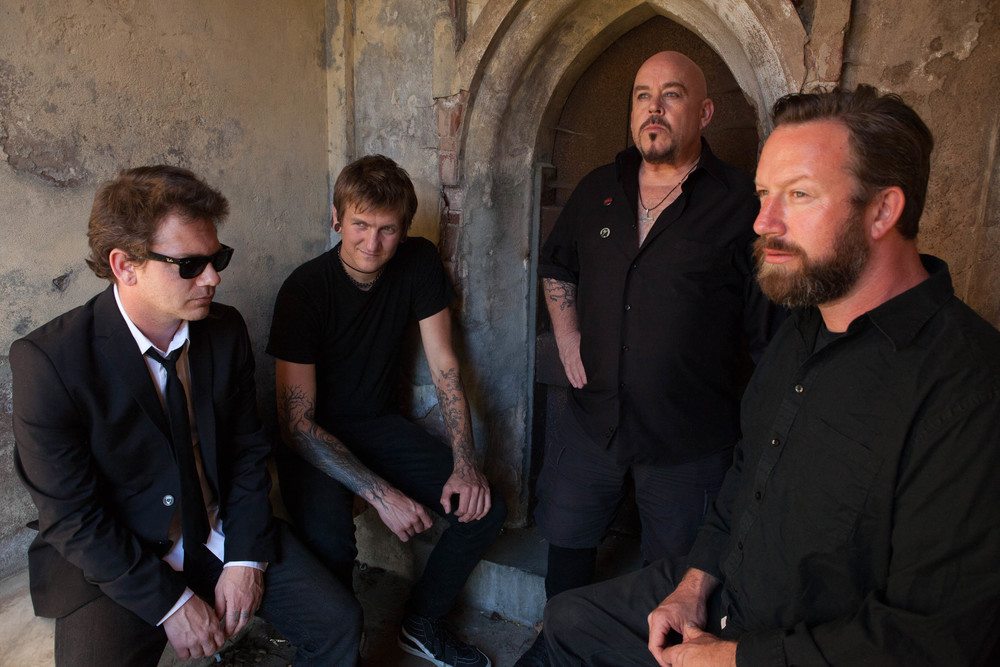
“The world’s getting smaller and smaller/I can’t see nowhere to go,” vocalist Shane Baker says on “The Shrinking World,” a song on Alaric’s captivating new record End Of Mirrors. From Baker’s perspective as a lifelong Bay Area resident, the world is definitely getting smaller; the tech economy is forcing out artists and long-term residents and bringing a stifling conformity to a region once known for eccentricity.
Nonetheless, Baker and his bandmates have managed to create special music even if their home – a region that also produced Metallica and Neurosis – is no longer the same nexus of underground creativity that it was for decades. End Of Mirrors combines Alaric’s early Neurosis education with Goth/death rock hallmarks like Christian Death and Bauhaus to create a sad but immersive listening experience and administer a needed shot of melancholy to the monochromatic rage of the underground. Baker talked to Decibel about death rock, learning to sing and End Of Mirrors. Last week, we hosted the premiere of Alaric’s new video for “Adore” — if you haven’t seen it make sure to check it out.
Decibel: Is it safe to say you all came from the Bay Area metal scene? Alaric has such an interesting approach– how did you find each other?
Baker: We’ve all known each other from the scene for a long time. I’ve known our drummer Jason (Willer) since high school – he’s a little bit younger. He had a band with our bass player Rick (Jacobus). We all grew up on Gilman Street seeing bands like Neurosis and all the hardcore bands that came through town. I’d say Jason put the band together. He was in Europe and came back to the US and had an idea for a dark band inspired by the heavy stuff we grew up with and some British anarcho stuff. Jason approached me to sing and we tested some guitar players and Russ (Kent’s) name kept coming up because of his connection to Noothgrush. We knew he was into this type of music. He started playing the music Rick had written and had all sorts of ideas. We started jamming in a practice space and it worked out.
Did you all know you had a common interest in artists like Christian Death and Bauhaus? Did you start with that common language or did that develop as you played together?
That was the starting point. We all knew we liked that stuff and we wanted to see what we could do with this music. Our music has never been faithful to stuff like that but we’ve definitely used it as a jumping-off point. We’re doing this music in 2016; we’re not trying to do a throwback, we’re trying to do something new with it and bring our own experiences to it.
What do you think it is about that music that is timeless? A lot of that music has never grown old. In many ways, you take it another step.
There are certain places you can only get to from that path. People associate this music with the 80s but that’s really only when it poked its head up into the commercial world. It’s not like this music ever went away; sometimes people pay attention and sometimes they don’t. What I love about the music it that it creates this other world and it’s super evocative and eccentric and strange.
It also conveys emotions like loss and regret and brings them to life in a way a lot of underground music can’t.
I agree. These are things everyone goes through and it’s a beautiful thing when you can bring it out into the world and express it. I always like that you can see how far down you can go with the music – just how dark can it be? If you look at a painting and it’s all blacks and grays and just a bit of red you realize you can express so much with just those colors. Limiting your palate can foster creativity and you can explore everything inside until it becomes something bigger.
It’s like musicians limiting themselves to a certain scale – it opens a whole world by setting strict limits.
Right. We do limit ourselves to a set of dark colors but inside that there is everything in the world. It’s all there — love and despair, the future and the past. It’s fractal.
There was a fair amount of time between the split with Atriarch and End Of Mirrors – was that just life getting in the way?
It was just life. We actually did break up for about a year. I went through a divorce. We talked to the guys from Neurosis about this record dating back to the New Year’s Eve shows in 2014. We probably had half of it written and a bunch of riffs in the can and then all sorts of shit hit the fan. We were supposed to play a show with Dispirit and Russ ended up in emergency surgery for appendicitis and I was in the hospital because of flu. Jason’s house burned down. We did tour in Europe for a few weeks. But ultimately it was just life, other bands and a series of calamities we managed to survive.
All of Alaric’s music requires vocal chops – singing. Had you done this in previous projects or did you have to grow?
My first band was a hardcore band called Dead and Gone. It was very growly and not melodic like I am singing now. I’ve done some singing like this in a band called Night After Night. We recorded a little but it never got released. I wanted to come to this project with some melody because I don’t hear much of that in the underground. It helps that all of this music is in a range that works for me (laughs). I definitely had to step up my game and get better but so has the rest of the band. We always try to write with our strengths in mind.
My entry point to Alaric was split you did with Atriarch a few years ago. I always come back to the song “Weep” – it makes me feel an intense sadness. What kind of music puts you in that mindset?
With that song we definitely wanted to evoke a certain feeling. When we were doing that record I was listening to early Pink Floyd and picking up on the street sadness, the melancholy of the early psychedelic scene. The Cure’s Disintegration album is a huge touch point for me. I think of our music as almost a combination of these things: a soaring melodic guitar and heartbeat drums and realistic lyrics. There’s nothing abstract or poetic — it’s more universal. Doing emotional music can be exhausting because it keeps bringing you back to these places over and over again but I love it because it’s a great catharsis. It lets people know that whatever they are feeling it’s something other people have, too.
I’ve always appreciated that you give listeners enough space to get lost in the moment and whatever they are feeling.
I really love that about this bad – there are dynamics that I’ve never done before. When you are a singer you are almost urged to sing over everything so you have something to do. With us, there is a back-and-forth between the guitars and the vocals and it leaves room. When I am writing lyrics it’s always a process of subtraction. I start with way too much stuff and wind up taking stuff out until it’s the bare essentials. (For example) we started writing “Adore” and “Wreckage” at the same time. I ended up using some of the same turns of phrase almost like it was the same song.
You’ve mentioned the band’s progression before – how did you want to progress on End Of Mirrors?
I wanted to integrate the old approach from our first album along with the approach of the split. The three songs on the split really came tougher for us. They almost have the same beat, tempo, and vibe. Ultimately, it was just the next group of songs we wrote. We have hours of tapes and parts that we’ll end of harvesting for whatever we do next. Ultimately, it’s just us trying to be more affecting and more real.

